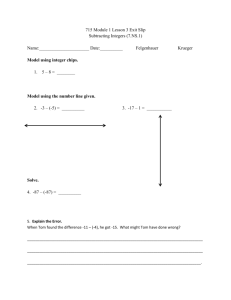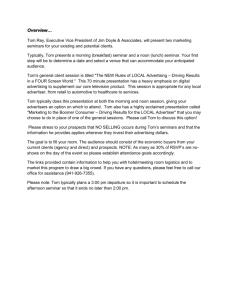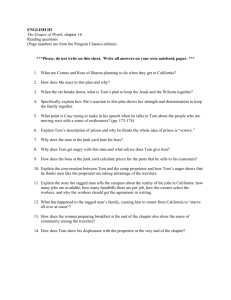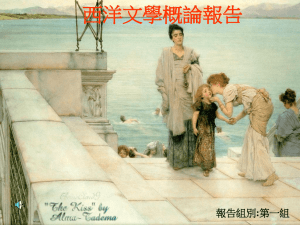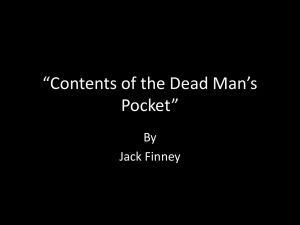MARK Task 1 (6 x 1 = 6 marks). You will hear a radio interview with
advertisement
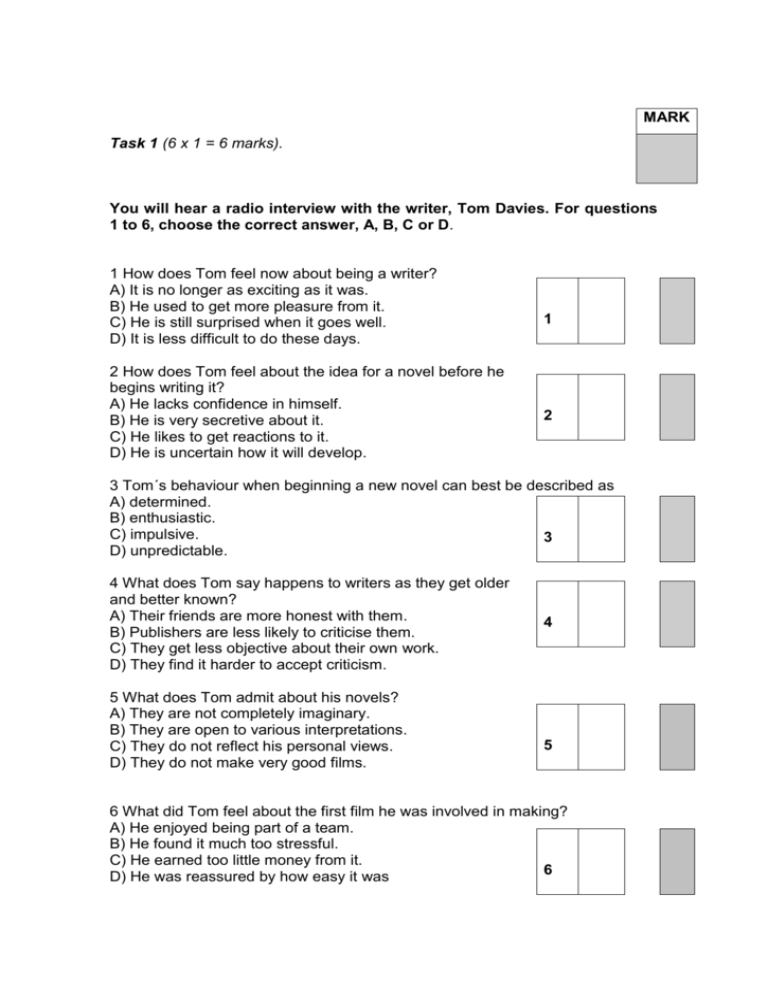
MARK Task 1 (6 x 1 = 6 marks). You will hear a radio interview with the writer, Tom Davies. For questions 1 to 6, choose the correct answer, A, B, C or D. 1 How does Tom feel now about being a writer? A) It is no longer as exciting as it was. B) He used to get more pleasure from it. C) He is still surprised when it goes well. D) It is less difficult to do these days. 2 How does Tom feel about the idea for a novel before he begins writing it? A) He lacks confidence in himself. B) He is very secretive about it. C) He likes to get reactions to it. D) He is uncertain how it will develop. 1 2 3 Tom´s behaviour when beginning a new novel can best be described as A) determined. B) enthusiastic. C) impulsive. 3 D) unpredictable. 4 What does Tom say happens to writers as they get older and better known? A) Their friends are more honest with them. B) Publishers are less likely to criticise them. C) They get less objective about their own work. D) They find it harder to accept criticism. 5 What does Tom admit about his novels? A) They are not completely imaginary. B) They are open to various interpretations. C) They do not reflect his personal views. D) They do not make very good films. 4 5 6 What did Tom feel about the first film he was involved in making? A) He enjoyed being part of a team. B) He found it much too stressful. C) He earned too little money from it. 6 D) He was reassured by how easy it was Task 2 (8 x 1 = 8 marks). MARK You are going to hear part of a radio programme investigating a recycling initiative in the English county of Dorset. For questions 1 to 8, decide whether each of these statements is true or false. 1. The local Council runs the recycling centres. 2. Dorset recycles about a third of domestic rubbish. 3. The recycling centres produce compost on site. 4. Rubbish from small businesses is not accepted at the centres. 5. Employees at the centres do not have to pay for items they take home. 6. There are no restrictions on what they sell to the public. 7. Some of the jewellery Gerry takes home is quite valuable. 8. The two students have come to look for some chairs. Task 3 (6 x 1 = 6 marks). Listen to the short presentation on the Clean Up the World movement and fill in the gaps in the sentences below. Clean Up the World is the biggest community-based (1) …………………project in the world. It was the idea of Ian Kiernan, who was motivated to act after (2) …………….. the effects of pollution on oceans. What Clean Up the World does is (3) ……………….. communities to take simple steps to protect their environment. The activities of the 2001 campaign include waste collection, water (4) …………….. and education programmes. Clean Up the World raises (5) ………………… about the wider effects of modern-day lifestyles. In its ninth year, Clean Up the World has been joined by some to the world´s most (6)………………….. global organisations. MARK KEY TASK 1 LISTENING COMPREHENSION from (CERTIFICATE IN ADVANCED ENGLISH 6 Cambridge)(Examination papers from university of Cambridge ESOL examinations) 1--------D 2--------D 3--------A 4--------B 5--------A 6--------A TASK 2 from : Straightforward advanced CD1 track 13 1. False – Private contractors run the centres on behalf of the Council. 2. True – It recycles 34%of all house hold waste. 3. False – It is produced in a special composting facility . It is only sold at the centres. 4. True – “Trade waste” is not accepted. 5. True – “That´s one of the perks of the job - it´s free for those of us that work here”, says Gerry. 6. False – They are not allowed to sell electrical goods. 7. False – “It´s all been fake up to now, unfortunately not worth much”. 8. False – They have come to buy something to put their clothes IN. TASK 3 (1) environment (2) witnessing (3) empower (4) treatment (5) awareness (6) recognised Tapescript for Task 1 Interviewer: My guest today is Tom Davies. He has written a series of highly – acclaimed novels, as well as a play and two successful filmscripts. He has said, “I love the solitude, the sheer pleasure of writing, the secret excitement.” Tom, writing is a solitary business, but does it go on being exciting? Tom Davies: Well, writing is an exciting process, although there are good days and bad days, obviously. I remember when I started, I used to sweat for so long over one sentence that it really wasn´t much of a pleasure. But I got past that stage and yes, I do find that when things go well, when things are working out, it is very absorbing. Interviewer: But surely less secret these days, now that you´ve won major prizes? Tom Davies: Possibly, I recently read out a whole chunk of my work-inprogress at a literary festival because it´s one way of trying these things out, whereas in the past I´d been too frightened that if I talked about what I was writing, I would somehow write, because I´m still not entirely sure myself which way it´s going to go. But once something is down in a first or second draft, then you can try it out and see how it sounds. Interviewer: And you´ve said that at any one time there are as many as ten or fifteen ideas for novels floating around in yur head. How do you choose which one to follow up? Tom Davies: You´ve got to find the idea that´s got the right kind of urgency and it´s not a rational decision. It´s patience and luck and turning up at your desk every morning even when nothing seems to be coming. If you´re not there, then nothing is precisely what will happen. But once I get started, then a good day would be two or three hundred words. Interviewer: And then do you hone it, do you go back over it? Tom Davies: I go back all the time until I get to the stage when I won´t look at it again because you need the distance of time to look back and see it from a different perspective. Interviewer: And is there anyone who you can then give this manuscript to and say, “Look, before I go any further, tell me what you think of this.”? Tom Davies: I give the finished draft to certain old friends who´re permitted to be as brutal as they like. That´s very useful because I think there´s a danger for writers as they get older, as their reputations get estabished, that publishers won´t tell them if they´ve any serious doubts about a piece. So sceptical friends are very important to give you the benefit of a truthful opinion. Interviewer: And you trust these friends? Tom Davies: Absolutely. The first time I tried this, years ago, a friend of mine said, “Look, I think this novel´s absolutely terrible, put it in a drawer and forget about it”. And I didn´t speak to him for eighteen months. But after that I learnt that if you give someone your novel to read, you´ve got to allow them to say that kind of thing. These days I wouldn´t take it so personally. Interviewer: And although you´ve denied any suggestion that you write about yourself, there are actually all sorts of bits and pieces of you dotted all over your work, aren´t there? Tom Davies: Someone said that you can´t write two hundred words in a novel without giving something of yourself away and I suppose that´s true. Perhaps that´s why I´ve always been a bit defensive about my work. Interviewer: Now, despite those two successful filmscripts, you haven´t, strangely, had a lot of luck translating your stories onto the big screen, have you? Why´s that? Tom Davies: Oh well, my first experience was of a low-budget English film. And because we had so little money to work with, it was wonderfully uncomplicated and I thought, “Oh what a brilliant life. I could write novels and then in between each one, I could do a film.” Interviewer: Because it´s so much easier? Tom Davies: Well, it was such fun being away on location surrounded by fabulously competent people, all taking fierce pride in their abitlity to do something so well and very quickly. The panic of the ticking clock, the things going wrong and then somehow being solved at the last minute, all that was marvellous for someone who usually spends his time locked up in an empty room. Interviewer: So it´s actually harder to write a good screenplay? Tom Davies: No, I wouldn´t say that. Indeed, I don´t think a screenplay is a literay form in itself. It´s more a set of instructions, a bit like a recipe. And you can fool yourself into thinking that you can see what´s going to be on the screen, but actually too many peeople intervene in the finished product, you´re just a part of the process, so it´s quite unlike a novel where you´re in sole charge, as it were. Interviewer: Tom, there, unfortunately, we have to leave it. Thank you ...... TASK 2 P: presenter S1: Student 1 FB: Francis Beard S2: Student 2 GT: Gerry Taylor M: Man P: Hello, I´m Carole Baker, and welcome on this bright, but rather cold December morning to Hotpoint. Now, today I´ve abandoned the warmth of our London studio and come down here to the south of Dorset so that I can talk....rubbish. Domestic rubbish, that is, household waste, and I´m inside the gates of one of the county´s eleven Household Recycling Centres. Now, it´s not quite nine o´clock yet, the gates are still closed but there´s already a substantial queue of people waiting outside to come in. With me to explain why, I have Francis Beard from the Dorset waste management services. Good morning, Francis. FB: Morning, Carole. Well, yes, this is just one of our initiatives to reduce the amount of household waste which ends up on rubbish dumps, or landfill sites as we call them now. Our Recycling Centres are all managed on behalf of the Council by private contractors, and we encourage them to recover as much waste as possible for reuse and recycing. And as part of this, we allow the contractors to sell whatever they can first. P: So that´s why these people are here, then, to see if they can pick up any bargains? FB: That´s right. The thing is, you see, every household in Dorset throws away, on average, more than one tonne of waste a year- which is about the same weight as a family car. Now, with space at a premium, the whole question of landfill is clearly problematic, so anything we can do to reduce that has to be a good thing. That´s our main aim- to keep rubbish out of landfill sites. And if we can sell it, it doesn´t have to be buried. P: But if you can´t sell it, presumably you try and recycle as much as possible. FB: Oh yes, indeed. In Dorset we recycle 34% of all household waste – that´s one of the best rates in the country. Anything which can be recycled is sorted by hand and then sent to different factories around the country. Plastic bottles can be made into clothes, cans can be used to make goods such as fridges and cutlery or more cans, and textiles are sent to developing countries or else turned into fillings for toys or stuffing for furniture. And then of course there´s compost. P: Compost? FB: Yes, we don´t have the resources here to produce it ourselves, so we send organic matter, like garden waste and kitchen vegetable scraps, to a special composting facility where it decomposes and decays to make compost. Compost is extremely rich in nutrients and ideal for helping plants to grow in the garden – we sell bags of it to the public here at our recycling centres. So it comes back to where it started. P: Now, Gerry Taylor, if I can bring you in here. You´re the site manger, aren´t you, Gerry? GT: That´s right, Carole. P: Now, you were telling me earlier about the kinds of things that people bring to the tip here. Some of them are pretty amazing, aren´t they? GT: Yeah, well, we, we, er take just about everything – except trade waste, that is – you know, rubbish from small businesses. Has to be household – and, er, tyres from cars and suchlike, can´t take them. We get everything from clothes, crockery and furniture to all sorts of electronic waste – “e-waste” they call it – things like fridges and cookers, computers, tellies, DVD players .... at the moment we´ve got a couple of clubs and er, oh yeah, er the other day, we had a fishing boat here. P: Really!? A fishing boat! GT: Yeah – huge it was. We only just managed to get it through the gates. Now why anyone would want to bring a fishing boat here I have no idea. He could have tried selling it himself. We had no trouble getting rid of it – somebody came in the next day and snapped it up £150 he paid for it, and very happy he was too! P: And you too, I imagine – that´s all profit for you. GT: That´s right, but as a rule we normally keep prices fairly low, a few quid, that´s all. And that money goes straight back into site management. As Mr Beard says, it´s all about keeping the rubbish out of landfill sites, it´s not about making profits. P: And do you ever buy any of the items yourself? GT: Ah, well, that´s one of the perks of the job – it´s free for those of us that work here. We can help ourselves. We get first choice on the stuff, and every day we sort through the skips before the gates open. P: So, what have you taken home? GT: Furniture mainly, tables, chairs, stuff for the garden. And I got my music centre from here, too. But the general public can´t buy that kind of thing – we´re not allowed to sell electrical goods. P: Why´s that? GT: Something to do with health and safety regulations – I just can´t do it. Anyway, what I mostly look out for it flashy jewellery. Sometimes someone chucks out an old chest-of-drawers and forgets to empty it out first. It doesn´t happen every day but I´ve taken home rings, bracelets, necklaces, that kind of thing. It´s all been fake up to now unfortunately, not worth much, but “beggars can´t be choosers”, can they? P: No, indeed. Now, one thing I´m curious to know is what kind of people come to the recycling centre to buy things. I can see that the gates have just been opened, so I´m going to talk to some of the people coming through...... Er, hello can I ask you what you´ve come looking for this morning? S1: Oh hi, er, yeah, we´ve just rented a flat, an unfurnished one. We´re both students. At the moment all we´ve got is a wooden crate – that´s our table – a couple of chairs we got from a rubbish skip in our street and er, er, what else have we got Jenny? S2: Two beds made out of pallets ....... S1: Oh yeah, that´s right, really comfortable they are, but nothing to put our clothes in. So that´s why we´re here. P: Well, good luck, let´s hope you find something. S1 and S2: Thanks. P: Here´s a gentleman on his own. Excuse me dir, could you tell us what you´ve come looking for? M: Oh, anything really – I´ve got my own junk shop down in the High Street....... TASK 3 Presenter: Clean Up the World is the biggest community-based environment project in the world. It started in 1989 in Sydney Hargbour with the success of Clean Up Australia Day, the biggest community event in the country. It is the idea of one person, an Australian yachtsman, Ian Kiernan, who was motivated to act after witnessing the effects of pollution and other rubbish on oceans across the globe. The international movement began in1993 and involved 30 million people in 80 countries. The first countries to become involved included superpowers such as the United States, Japan and China and smaller nations such as the Comoros, Kiribati and Nauru. What Clean Up the World does is empower communities to take simple, positive steps to protect their environment. It also has links with community groups, environment groups and businesses throughout the world. Its popularity has brought about the involvement of 124 countries and approximately 37.5 million people as of January 2000. Now let me mention a few details about the Clean Up the World Campaign 2001. The ninth annual Clean Up the World campaign took place over the weekend of September 21-23, 2001. It involved a wide range of activities including waste collection, water treatment and education programmes. New countries like Ukraine, Mongolia and Taiwan participated in their first Clean Up the World campaign this year. The executive director of the United Nations Environment Programme (UNEP), Mr Klaus Toepfer, highlighted the enormous contribution volunteers made to the prosperity of communities and the health and protection of natural environments in the campaign this year: “Clean Up the World raises awareness about the wider effects of modern-day lifestyles. This hopefully means that more people become motivated to fight not only litter and rubbish but the more invisible kinds of environmental pollution that poison our seas, air and land,” Mr Toepfer said. Clean Up the World (or CUW, as it is known) has been joined in its ninth year by some of the world´s most recognised global organisations dedicated to conservation, including the United Nations Environment Programme and National Geographic Channels International.

